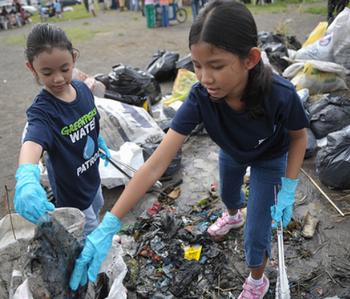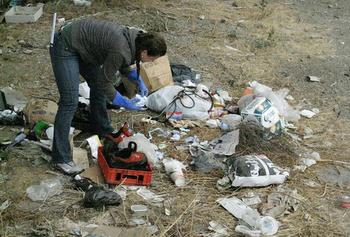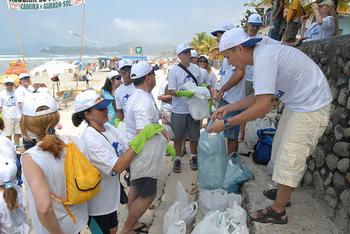Volunteers Clean the World's Beaches This Weekend
WASHINGTON, DC, September 18, 2009 (ENS) - The Ocean Conservancy's International Coastal Cleanup, the world's largest volunteer effort to help protect oceans and waterways, gets underway Saturday with hundreds of thousands of volunteers expected to pick up trash on beaches around the globe. The International Coastal Cleanup has been held on the third Saturday of September since 1986.
The volunteers keep track of every piece of trash they find and report it to the nonprofit Ocean Conservancy, which uses that information to produce an annual country-by-country, state-by-state index of marine debris.
 |
Greenpeace Water Patrol volunteers and students from Laguna Province lead a trash cleanup at Laguna Lake, south of Manila, Philippines. September 20, 2008. (Photo courtesy Greenpeace Southeast Asia) |
Of the 43 items tracked during the Coastal Cleanup, the top three items of trash found in 2008 were cigarette butts, plastic bags, and food wrappers/containers, according to the Ocean Conservancy's latest report.
During the 2008 Cleanup, some 390,880 volunteers removed 6.8 million pounds of debris from 6,485 sites in 100 countries as well as 42 U.S. states and the District of Columbia.
They removed more than 400 pounds of debris for every mile of beach cleaned.
"The ocean is our life support system yet marine debris continues to threaten its health. Trash littering our beaches and choaking our ecosystems is a threat to wildlife, our coastal economies, and ultimately to the ability of the ocean to sustain us," said Vikki Spruill, president and chief executive of Ocean Conservancy.
"The Cleanup gives everyone a chance to work in their backyards and be a part of this special movement for our oceans," Spruill said. "Join me and hundreds of thousands of volunteers around the world this September 19th as we Start a Sea Change."
Philippe Cousteau, president and CEO of EarthEcho International and a Ocean Conservancy Board member, said, "I grew up with the ocean. Sitting with my grandfather [Jacques Cousteau] and listening to his life’s stories - hearing the urgency in his voice - being inspired by the passion that he had for taking action for our water planet."
"The oceans are the life support system of this planet," said Cousteau. "They are in peril, and it is critical that we all know we have a responsibility to protect and restore the oceans because everything we do makes a difference, all of our choices have consequences."
Picking up rubbish from the beaches around the Pacific Rim keeps it out of the garbage patch the size of Texas that is floating in the North Pacific ocean just north of the Hawaiian Islands.
 |
Volunteer sorts through trash collected at San Francisco Bay beach on Coastal Cleanup Day, September 20, 2008 (Photo by Jocelyn Gretz courtesy Save the Bay) |
The Ocean Conservancy maintains that the marine debris problem is solvable, often through simple, existing measures. "Armed with knowledge about the most prevalent components of marine debris, elected officials can make informed policy decisions, community leaders can tailor and expand recycling and other trash-reduction programs, corporate decision makers can improve technology and reduce packaging, and individuals can recycle, reuse, or properly dispose of trash to keep these items out of the ocean in the first place," the group says in its latest report.
For instance, in San Francisco, Save The Bay this week released its fourth annual list of Bay Trash Hot Spots, 10 Bay shoreline and creek areas plagued by plastic bags. Coastal Cleanup events Saturday will take place at many of these sites. www.saveSFbay.org/baytrash
The 2009 Hot Spots are the 10 shorelines and creeks where volunteers removed the most plastic bags on Coastal Cleanup Day last year. Then, volunteers picked up nearly 15,000 plastic bags from these locations. Save The Bay estimates that more than one million plastic bags wind up in San Francisco Bay each year.
"Plastic bags are among the most harmful, ubiquitous and preventable types of Bay pollution," Save The Bay Executive Director David Lewis said Tuesday. "It is time for cities and residents to take a stand against plastic bag pollution to protect the Bay, wildlife and our quality of life."
Save The Bay is asking the mayors of the Bay Trash Hot Spots cities to prioritize legislation that ends the distribution of free single-use bags, both plastic and paper – a move that will require residents to switch to reusable bags.
 |
Volunteers at the International Coastal Cleanup in Brazil, 2007. (Photo courtesy Ocean Conservancy) |
This year, Ocean Conservancy is teaming up with Aurora Select, a global network of professional photographers, to document volunteers around the world as they participate in the International Coastal Cleanup. Photos from 20 sites in Thailand, Greece, Japan, South Africa, and throughout the United States, including Washington DC, Florida, Texas and Hawaii will be posted online here.
Corporations can help support the Coastal Cleanup. On Tuesday, September 22, northern California Whole Foods Markets will be donating five percent of net sales to California Coastal Cleanup Day.
Coca-Cola has been supporting the International Coastal Cleanup since 1995 and has been the lead sponsor since 2005 raising awareness of the issue of marine debris and the personal responsibility we all share in solving the problem. In 2008, Coca-Cola activated a network of over 50,000 employees and associates in 35 countries to help clear beaches and waterways of debris.
As part of its $20 billion, 10-year initiative to address climate change, Bank of America has supported the International Coastal Cleanup for the past several years, with thousands of associates participating in cleanup events across the United States and around the world.
Other national sponsors include Booz Allen Hamilton; The Dow Chemical Company; Philip Morris USA, an Altria Company; the National Oceanic and Atmospheric Administration, NOAA; and the U.S. Environmental Protection Agency.
Copyright Environment News Service (ENS) 2009. All rights reserved.
To subscribe or visit go to: http://www.ens-newswire.com